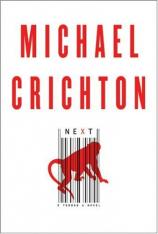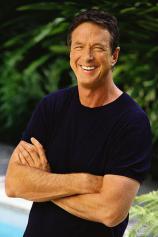Excerpt
Excerpt
Next

Chapter One
Division 48 of Los Angeles Superior Court was a wood-paneled room
dominated by the great seal of the state of California. The room
was small and had a tawdry feeling. The reddish carpet was frayed
and streaked with dirt. The wood veneer on the witness stand was
chipped, and one of the fluorescent lights was out, leaving the
jury box darker than the rest of the room. The jurors themselves
were dressed casually, in jeans and short-sleeve shirts. The
judge's chair squeaked whenever the Honorable Davis Pike turned
away to glance at his laptop, which he did often throughout the
day. Alex Burnet suspected he was checking his e-mail or his
stocks.
All in all, this courtroom seemed an odd place to litigate complex
issues of biotechnology, but that was what they had been doing for
the past two weeks in Frank M. Burnet v. Regents of the
University of California.
Alex was thirty-two, a successful litigator, a junior partner in
her law firm. She sat at the plaintiff's table with the other
members of her father's legal team, and watched as her father took
the witness stand. Although she smiled reassuringly, she was, in
fact, worried about how he would fare.
Frank Burnet was a barrel-chested man who looked younger than his
fifty-one years. He appeared healthy and confident as he was sworn
in. Alex knew that her father's vigorous appearance could undermine
his case. And, of course, the pretrial publicity had been savagely
negative. Rick Diehl's PR team had worked hard to portray her dad
as an ungrateful, greedy, unscrupulous man. A man who interfered
with medical research. A man who wouldn't keep his word, who just
wanted money.
None of that was true—in reality, it was the opposite of the
truth. But not a single reporter had called her father to ask his
side of the story. Not one. Behind Rick Diehl stood Jack Watson,
the famous philanthropist. The media assumed that Watson was the
good guy, and therefore her father was the bad guy. Once that
version of the morality play appeared in the New York Times
(written by the local entertainment reporter), everybody else fell
into line. There was a huge "me, too" piece in the L.A.
Times, trying to outdo the New York version in vilifying her
father. And the local news shows kept up a daily drumbeat about the
man who wanted to halt medical progress, the man who dared
criticize UCLA, that renowned center of learning, the great
hometown university. A half-dozen cameras followed her and her
father whenever they walked up the courthouse steps.
Their own efforts to get the story out had been singularly
unsuccessful. Her father's hired media advisor was competent
enough, but no match for Jack Watson's well-oiled, well-financed
machine.
Of course, members of the jury would have seen some of the
coverage. And the impact of the coverage was to put added pressure
on her father not merely to tell his story, but also to redeem
himself, to contradict the damage already done to him by the press,
before he ever got to the witness stand.
Her father's attorney stood and began his questions. "Mr. Burnet,
let me take you back to the month of June, some eight years ago.
What were you doing at that time?"
"I was working construction," her father said, in a firm voice.
"Supervising all the welding on the Calgary natural gas
pipeline."
"And when did you first suspect you were ill?"
"I started waking up in the night. Soaking wet, drenched."
"You had a fever?"
"I thought so."
"You consulted a doctor?"
"Not for a while," he said. "I thought I had the flu or something.
But the sweats never stopped. After a month, I started to feel very
weak. Then I went to the doctor."
"And what did the doctor tell you?"
"He said I had a growth in my abdomen. And he referred me to the
most eminent specialist on the West Coast. A professor at UCLA
Medical Center, in Los Angeles."
"Who was that specialist?"
"Dr. Michael Gross. Over there." Her father pointed to the
defendant, sitting at the next table. Alex did not look over. She
kept her gaze on her father.
"And were you subsequently examined by Dr. Gross?"
"Yes, I was."
"He conducted a physical exam?"
"Yes."
"Did he do any tests at that time?"
"Yes. He took blood and he did X-rays and a CAT scan of my entire
body. And he took a biopsy of my bone marrow."
"How was that done, Mr. Burnet?"
"He stuck a needle in my hipbone, right here. The needle punches
through the bone and into the marrow. They suck out the marrow and
analyze it."
"And after these tests were concluded, did he tell you his
diagnosis?"
"Yes. He said I had acute T-cell lymphoblastic leukemia."
"What did you understand that disease to be?"
"Cancer of the bone marrow."
"Did he propose treatment?"
"Yes. Surgery and then chemotherapy."
"And did he tell you your prognosis? What the outcome of this
disease was likely to be?"
"He said that it wasn't good."
"Was he more specific?"
"He said, probably less than a year."
"Did you subsequently get a second opinion from another
doctor?"
"Yes, I did."
"With what result?"
"My diagnosis was . . . he, uh . . . he confirmed the diagnosis."
Her father paused, bit his lip, fighting emotion. Alex was
surprised. He was usually tough and unemotional. She felt a twinge
of concern for him, even though she knew this moment would help his
case. "I was scared, really scared," her father said. "They all
told me . . . I didn't have long to live." He lowered his
head.
The courtroom was silent.
"Mr. Burnet, would you like some water?"
"No. I'm fine." He raised his head, passed his hand across his
forehead. "Please continue when you're ready."
"I got a third opinion, too. And everybody said to me that Dr.
Gross was the best doctor for this disease."
Excerpted from NEXT © Copyright 2011 by Michael Crichton.
Reprinted with permission by HarperCollins, an imprint of
HarperCollins Publishers. All rights reserved.




